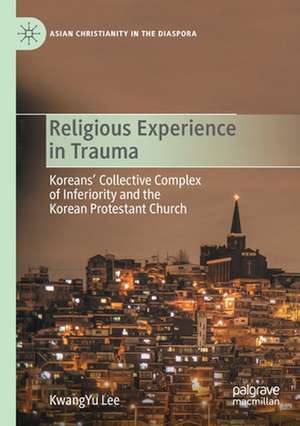Religious Experience in Trauma: Koreans’ Collective Complex of Inferiority and the Korean Protestant Church: Asian Christianity in the Diaspora
Autor KwangYu Leeen Limba Engleză Paperback – 4 sep 2021
| Toate formatele și edițiile | Preț | Express |
|---|---|---|
| Paperback (1) | 635.47 lei 6-8 săpt. | |
| Springer International Publishing – 4 sep 2021 | 635.47 lei 6-8 săpt. | |
| Hardback (1) | 640.88 lei 6-8 săpt. | |
| Springer International Publishing – 4 sep 2020 | 640.88 lei 6-8 săpt. |
Din seria Asian Christianity in the Diaspora
-
 Preț: 382.57 lei
Preț: 382.57 lei - 15%
 Preț: 694.87 lei
Preț: 694.87 lei -
 Preț: 386.81 lei
Preț: 386.81 lei - 15%
 Preț: 582.45 lei
Preț: 582.45 lei - 15%
 Preț: 581.98 lei
Preț: 581.98 lei - 18%
 Preț: 727.48 lei
Preț: 727.48 lei -
 Preț: 484.30 lei
Preț: 484.30 lei -
 Preț: 384.70 lei
Preț: 384.70 lei -
 Preț: 382.75 lei
Preț: 382.75 lei -
 Preț: 450.88 lei
Preț: 450.88 lei -
 Preț: 381.59 lei
Preț: 381.59 lei - 15%
 Preț: 633.19 lei
Preț: 633.19 lei - 15%
 Preț: 690.29 lei
Preț: 690.29 lei - 15%
 Preț: 689.14 lei
Preț: 689.14 lei - 15%
 Preț: 635.80 lei
Preț: 635.80 lei -
 Preț: 450.88 lei
Preț: 450.88 lei -
 Preț: 451.87 lei
Preț: 451.87 lei -

Preț: 635.47 lei
Preț vechi: 747.61 lei
-15% Nou
Puncte Express: 953
Preț estimativ în valută:
121.59€ • 126.96$ • 100.64£
121.59€ • 126.96$ • 100.64£
Carte tipărită la comandă
Livrare economică 04-18 aprilie
Preluare comenzi: 021 569.72.76
Specificații
ISBN-13: 9783030535858
ISBN-10: 3030535851
Pagini: 199
Ilustrații: X, 199 p.
Dimensiuni: 148 x 210 mm
Greutate: 0.28 kg
Ediția:1st ed. 2020
Editura: Springer International Publishing
Colecția Palgrave Macmillan
Seria Asian Christianity in the Diaspora
Locul publicării:Cham, Switzerland
ISBN-10: 3030535851
Pagini: 199
Ilustrații: X, 199 p.
Dimensiuni: 148 x 210 mm
Greutate: 0.28 kg
Ediția:1st ed. 2020
Editura: Springer International Publishing
Colecția Palgrave Macmillan
Seria Asian Christianity in the Diaspora
Locul publicării:Cham, Switzerland
Cuprins
1. Introduction: The Korean Protestant Church at Present and the Necessity of a Psychohistorical Approach to Its History.- 2. : A Historical Sketch of the Growth of the Korean Protestant Church in the Twentieth Century.- 3. : A Jungian Psychohistorical Theory: An Interpretive Tool.- 4. The Traumatic Twentieth Century of Korea: Japanese Imperialism, the Korean War and the Korean Military Governments.- 5. The Growth of the Korean Protestant Church from a Jungian Psychohistorical Perspective: Trauma, Cultural Complex, the Theology of Prosperity/Bliss and the Governmental Support.- 6. Conclusion: The Korean Protestant Church with the Cultural Complex of Inferiority.
Notă biografică
KwangYu Lee is an ordained minister of the Korean Methodist Church. Currently he works for Korean Community Church of New Jersey and is a guest lecturer for the Pastoral Care and Counseling Program in Korean of Blanton-Peale Institute & Counseling Center.
Textul de pe ultima copertă
This book offers a psychohistorical analysis of the rapid growth of the Korean Protestant Church. KwangYu Lee looks at some of the traumatic historical events of Korea in the 20th century, including the fall of the Joseon Dynasty (1392-1910), the Japanese Occupation (1910-1945), the Korean War (1950-1953), and the Korean Military Dictatorship (1961-1987), and explores the psychological impacts of these events on the collective unconsciousness of Koreans. He argues that Koreans’ collective (or cultural) complex of inferiority, which was caused and gradually exacerbated by these traumatic events, along with their psychological relationships with their two colonizers—the Japanese and Americans—prompted them to convert to Korean Protestantism en masse as a means to avoid their psychological pains and to fulfil their futile desire to become like Americans, their overtly idealized psychological-object.
Caracteristici
Presents a psycho-historical interpretation of the rapid growth of Korean Protestantism in the 20th century Offers historical records of Koreans' traumatic experiences that gave rise to a collective complex of inferiority Presents an outline of psycho-historical theory
